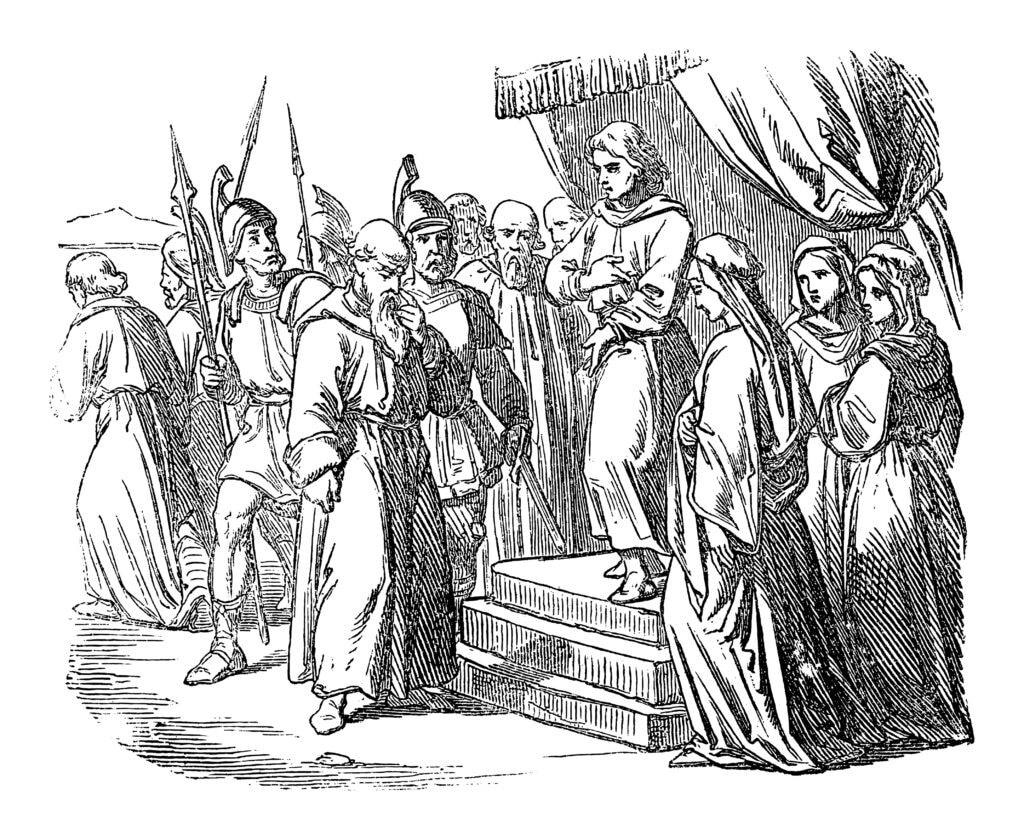When the Hasmonian king Jonathan sent a letter to the Spartans seeking an alliance, he made a fascinating remark worth repeating. According to 1 Maccabees, King Jonathan says, “We have the holy scrolls as encouragement” (1 Maccabees 12:9). This statement indicates that Jonathan, or, more generally, the author of 1 Maccabees, recognized a canon of Scripture, likely the Hebrew canon we know today. But the quote also seems to indicate another thing: that the Maccabean author did not consider his work to be part of this canon.
The Hebrew Bible does not include the Apocrypha. Nevertheless, in the Septuagint, and in Bibles of the Roman Catholics and the Eastern Orthodox, the Apocrypha appears. So, does the Apocrypha belong in our Bibles? Are the books of the Apocrypha canonical?
Criteria for Canon
First, a word on what we mean by canonical and how books became part of our Bible. There are many resources on this subject, so we’ll keep it brief. The word canon means “rule,” and it refers to the books that the Jews regarded as having rule over the Jewish faith, and later, to the books that Christians regarded as having rule over the Christian faith. Books that are canonical are books that must be obeyed and treated as definitive. They are called Scripture. Non-canonical books may be old and important, but they are not considered Scripture. The study of the canon is both historical (i.e., how did the books in our Bible get there?) and theological (i.e., which books belong in the Bible?).
In both Judaism and Christianity, the process of developing the canon was long and complex, but we can summarize each process rather simply. In Judaism, books were considered canonical 1) when they had their origin in the work of one of the prophets, 2) when they were connected to Israeli Judaism (as opposed to Jewish writings from Alexandria or elsewhere), and 3) when they had the authority of great age. These books were considered inspired, that is, from God himself. The thirty-nine books[1] in the Hebrew canon fit these criteria, especially the first criterion of prophetic origin, since all the canonical Old Testament books were in some way or another connected to the prophets.
“In Judaism, books were considered canonical 1) when they had their origin in the work of one of the prophets, 2) when they were connected to Israeli Judaism (as opposed to Jewish writings from Alexandria or elsewhere), and 3) when they had the authority of great age.”
The Torah was from the prophet Moses, the prophetic works were from the inspired prophets of the Hebrew faith, and the historical, poetic, and wisdom literature were connected to prophets such as Joshua, David, and others. Since the prophets were inspired by God, the Old Testament canon was considered inspired by God. And since these works were inspired by God, they carried the authority of God.
The criteria for recognizing the New Testament canon were essentially the same, except that the criteria included both prophetic and apostolic authorship. New Testament books are canonical because they were connected to or written by a New Testament apostle or prophet. The works of Paul are from the apostle Paul. Matthew, Peter, and John were all apostles. Even Luke and Mark are apostolic, since Luke worked with Paul, and Mark worked with Peter. Since New Testament books were connected to an apostle or prophet, they were considered inspired by God, and therefore, granted the authority over the Christian faith that they deserve.
From these tests of canonicity, we can see prima facie that the Old Testament Apocrypha fail, since they are not historically connected to the Old Testament prophets, even if they claim to be, as in the case of the additions to Daniel or the letter of Jeremiah—both of which are obviously later compositions. The Apocrypha do not pass the test of antiquity, obviously coming from the later Intertestamental period. And many are not grounded in Israeli Judaism, but rather come from outside the land of Israel (Alexandria). So the Apocrypha could not be considered canonical by mainstream Jews—it simply didn’t pass the test of canonicity.
“The Apocrypha could not be considered canonical by mainstream Jews—it simply didn’t pass the test of canonicity.”
Reception within Judaism
This conclusion is confirmed in mainstream Judaism, for whom the Apocrypha are simply not canonical. And this is true in spite of the fact that a few of the Apocryphal works appear in the Dead Sea Scrolls. We must remember that merely possessing a copy of an Apocryphal work does not mean that it was considered canonical. Mainstream Judaism knew of the Apocryphal works, and even used them on occasion, but they did not consider them canonical. Mainstream Judaism’s rejection of the Apocrypha as part of the canon is ancient.
This rejection was finalized at the Council of Jamnia. In this first century A.D. council, held in the coastal town of Jamnia (also called Javneh) shortly after the fall of Jerusalem, the leading rabbis of Israel and surroundings met to articulate a Judaism without the Temple. At Jamnia, the rabbis affirmed once and for all that the Jewish Scriptures would include all of the books we recognize in our Protestant Bibles, but would not include the books of the Apocrypha.
Later rabbis affirmed this, rejecting the Apocrypha from the canon. This is demonstrated in various rabbinic writings through the centuries as well as by the fact that the best manuscripts of Hebrew Scripture that survive from ancient Judaism (the Aleppo and Leningrad codices) do not include the Apocrypha. Indeed, in the Jewish synagogues around the world today, the traditional canon of our thirty-nine books is still affirmed and the Apocrypha are rejected—from synagogues of Brooklyn, N.Y., to Brazil, to Israel, to Lithuania, and around the world. The Jews rejected the Apocrypha as canonical.
“Mainstream Judaism knew of the Apocryphal works, and even used them on occasion, but they did not consider them canonical.”
The Logic Behind Not Accepting the Apocrypha
So, the primary reason that Christians should not accept the Apocrypha in our Bibles is that it was not in the canon of the Hebrew scriptures. It’s really that simple. Since the Jews rejected the Apocrypha as canonical, we should not include the Apocrypha in our Bibles.
It is important to note that this seems to be affirmed by Jesus and the apostles: Jesus knew about the Apocrypha, and the New Testament authors surely knew various Apocryphal books. But the New Testament never quotes from the Apocrypha, even though the New Testament quotes or makes strong references to the canonical texts of the Hebrew Bible as many as four hundred times. Jesus and the apostles, including to some extent Paul, were Israeli Jews, and Israeli Jews generally didn’t accept the Apocrypha as canonical. Given this evidence, we can safely conclude that Jesus and the apostles did not consider the Apocrypha as canonical, even though they knew the Apocrypha.
This is enough reason for the church today not to accept the Apocrypha as canonical. The Apocrypha is late, historically unconnected to any prophet, and extraneous to traditional Judaism. The Apocrypha does not claim to be inspired of God. The New Testament apostles did not quote the Apocrypha as Scripture. Jesus didn’t quote from the Apocrypha as Scripture. So, we shouldn’t accept the Apocrypha in our canon of Scripture, either.
“The Apocrypha does not claim to be inspired of God. The New Testament apostles did not quote the Apocrypha as Scripture. Jesus didn’t quote from the Apocrypha as Scripture.”
A Mixed Reception in the Early Church
The only real reason there has been a debate about the Apocrypha in the church is that the early church generally used the Septuagint. This explains why several early Christian writers quote the Apocrypha, at times using it as Scripture. For example, Irenaeus, Tertullian, and Cyprian all considered the Apocrypha canonical, since it was in their Greek Old Testaments. The great theologian Augustine openly argued for inclusion of the Apocrypha, and several church councils affirmed the use of the Apocrypha in the church’s canon: the Councils of Rome (382), Hippo (383), and Carthage (397). All the while, the church also recognized that the Apocrypha was different, perhaps even secondary, to the Hebrew canon.
The Eastern Orthodox tradition, dependent on the Greek translation of the Old Testament, adopted the Apocrypha as canonical, and still uses it today. The Roman Catholic tradition eventually kept the Apocrypha, but with the uneasy understanding that it is secondary to the Hebrew canon—that is, it is deuterocanonical—a second collection of works.
But the early church didn’t uniformly accept the Apocrypha. The very important biblical scholar Origen (d. 253), who lived in Alexandria, where the Septuagint originated, knew that the Apocrypha was not in the Hebrew canon, and looked with suspicion on the Apocrypha. Origen’s solution to the question was eventually to say that the church can use the Apocrypha, but that the church shouldn’t consider it canonical.
“The early church didn’t uniformly accept the Apocrypha.”
Athanasius, the orthodox hero of Nicaea, also considered the Apocrypha to be secondary to the Hebrew canon, even though he admitted that reading the Apocrypha could be useful. In A.D. 367, Athanasius issued a festal letter to his churches. In that letter, he lists the sixty-six books of the canon that we receive today. And though he mentions the Apocrypha, he lists it separate from the canon in a category he calls “edifying.”
Jerome, the foremost scholar of his time (d. 420), knew the Apocrypha should not be treated as canonical. So when Jerome, who worked in Bethlehem, created one of the most important translations of the Bible in history—the Latin Vulgate—he sought to exclude the Apocrypha from his important work. It was only under pressure from others that he conceded and put the Apocrypha into his translation. Thus, the Apocrypha became common in the Catholic church, which uses the Vulgate still.
The Reformers and the Bible
When the Reformers—Luther and Calvin—sought to return the church to its pre-Catholic days and to establish the principle of Sola Scriptura, they knew that the Apocrypha was a problem. The principle of Sola Scriptura—following only the scriptures—demands that we are precise on which books are counted as scriptures. So even though both Calvin and Luther used the Apocrypha—after all, it was in almost every copy of the Christian scriptures by this time—both eventually rejected the Apocrypha as canonical. This was true even though they considered the Apocrypha useful for the church.
It was Luther’s view that the Apocryphal books were useful to the church, that led him to include the Apocrypha in his German translation of the Bible. In fact, the English reformers had a difficult time removing the Apocrypha from their translations, even as they rejected the Apocrypha from the canon. The tradition of including the Apocrypha was old enough that Protestants were slow to remove it from their translations of the Bible.
Luther and Calvin were right to reject the Apocrypha: to accept only the scriptures as our rule of faith is to accept only the thirty-nine books of the Jewish faith as our Old Testament.
“The tradition of including the Apocrypha was old enough that Protestants were slow to remove it from their translations of the Bible.”
But the Catholics dug in. So, in response to Luther and Calvin, the Catholic Church officially declared a handful of Apocryphal books as canonical at the Council of Trent (1546), neglecting some of their own earlier theologians. The Council of Trent included nine Apocryphal works in the Catholic canon, with these nine including combinations that separately include twelve of the eighteen works described above (all except for 1 Esdras, Prayer of Manasseh, Psalm 151, 3 Maccabees, 2 Esdras, and 4 Maccabees). This is why Catholic Bibles uniformly have the Apocrypha. But there seems to be another reason behind this Catholic insistence on including the Apocrypha. Several apocryphal works lend support to a couple of Catholic doctrines. Most obvious of these is found in 2 Maccabees 12:43–45, which the Catholic church believes supports the Catholic doctrine of purgatory, which otherwise is not found in Scripture.
The Protestant Bibles and liturgy continued to make some use of the Apocrypha for a couple hundred years after Calvin and Luther, but always as non-canonical. Various creeds, confessions, and statements of the reformed churches affirmed the usefulness of the Apocrypha, while denying the canonicity of the Apocrypha. For example, the Westminster Confession of Faith (1647) says, “The books commonly called Apocrypha, not being of divine inspiration, are no part of the canon of the Scripture, and therefore are of no authority in the church of God, nor to be any otherwise approved, or made use of, than other human writings” (1:3).
“Various creeds, confessions, and statements of the reformed churches affirmed the usefulness of the Apocrypha, while denying the canonicity of the Apocrypha.”
Gradually, Protestant translations of the Bible began dropping the Apocrypha altogether. It took a while. The King James Translation of 1611 originally included the Apocrypha, as the English tradition was still breaking with the Apocrypha. The Anglican liturgy included some quotes from the Apocrypha, even though the Anglican communion was issuing statements relegating it to mere “encouragement.” By the nineteenth century, most Protestant Bibles, at least in English, excluded the Apocrypha altogether, and most Protestant faiths had completely dropped the use of the Apocrypha.
When we pick up an English translation of the scriptures today, typically it will not include the Apocrypha, and rightly so. And when we go to a Protestant church, especially an Evangelical one, the Apocrypha is almost never mentioned, and if it is mentioned, it is treated merely as an ancient work of history.
Is the Apocrypha Scripture?
So, should the Apocrypha be included in our Bibles? That answer is no. Again, the Apocrypha is not included in the Jewish Bible. The Apocrypha does not have the hallmarks of canonicity: it is not historically connected to one of the prophets (even if it claims to be, the writings are too late for the connection to be authentic). It does not have the authority of antiquity, and it is not uniformly associated with mainstream Judaism. To put it more precisely, the Apocrypha is not inspired by God, and therefore, it possesses no binding authority, either for Jews or for Christians.
But this does not mean the Apocrypha is useless. It has a lot of value for us today. We are much richer for having the works included in the Apocrypha. They fill in a lot of information about the intertestamental period we would lack without them. They also provide insight into what Jews were facing with the constant threat of assimilation and hostile regimes. These works are sometimes rich with wisdom, with encouragement, and with theology. Without the Apocrypha, our insight into the world of Scripture would be poorer. In short, these works are very valuable, even if they are not canonical.
“These works are very valuable, even if they are not canonical.”
So, in conclusion, we can say about the Apocrypha that it is important, but not canonical. It is old, but not old enough. It is useful, but not inspired. Read the Apocrypha and learn from it, but don’t confuse it for Scripture.
[1] The Jews do not count the books of the Hebrew canon the same way we do. Rather, they combine several books such that they only count twenty-four books, the so-called Tanakh: the Torah, the Prophets, and the Writings. In spite of this, however, all thirty-nine books in the Protestant Old Testament are in these twenty-four works, and no additional books are found in the Tanakh.













